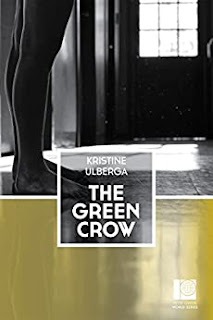Stephanie Jane recenzis The Green Crow de Kristine Ulberga
Surreal Latvian fiction
5 steloj
If you, like me, adore surreal Eastern European fiction with hints of magical realism and unreliable narrators, then I think that you will love The Green Crow. I found it to be a complex novel to read, but a wonderfully insightful and rewarding one. I was frequently unsure as to what was real and what imagined, especially because the Green Crow himself is such a boisterous and mischievous character that it was hard to write him off as just a child's imaginary friend. Also, our narrator herself never actually acknowledges her own name so, despite her telling us her story in the first person, we generally only see her in relation to other people or to the Crow. I particularly loved the verbal sparring between the four women sharing the asylum room - our unnamed narrator and three others she has named Fright, F22 and Snow White. Each has their …
If you, like me, adore surreal Eastern European fiction with hints of magical realism and unreliable narrators, then I think that you will love The Green Crow. I found it to be a complex novel to read, but a wonderfully insightful and rewarding one. I was frequently unsure as to what was real and what imagined, especially because the Green Crow himself is such a boisterous and mischievous character that it was hard to write him off as just a child's imaginary friend. Also, our narrator herself never actually acknowledges her own name so, despite her telling us her story in the first person, we generally only see her in relation to other people or to the Crow. I particularly loved the verbal sparring between the four women sharing the asylum room - our unnamed narrator and three others she has named Fright, F22 and Snow White. Each has their own isuues that they cope with to a greater or lesser extent, and the way Ulberga merges their different realities through their conversations is simply inspired.
At its heart, The Green Crow is a sad novel about the adult aftermath of childhood neglect and abuse, and parental marital infidelity. The more I learned of our narrator's formative years, the more I felt I could understand her clinging to the Green Crow, even as her friendship with him was destroying her relationships with her own husband and children. At one point she admits that it is more socially acceptable to be deemed insane than to abandon one's own family. We see that she cannot reconcile herself to an ordinary family life, yet also cannot just walk away so the only future apparently offered to her is that of the asylum.
I'm not sure I fully understood all the references within The Green Crow and it would be interesting to learn what Latvian speakers made of the original language version as there must have been so much that didn't perhaps quite keep its earlier meaning in translation. Which isn't to say that I am finding any fault with the translation work. Far from it. However to render such an intense novel into another culture's language and idioms must be such a complicated process. I am so happy to have had this opportunity to read The Green Crow in English though. The story kept me captivated throughout and I did feel a little bereft at the final page. I understand that this book won't appeal to a particularly wide readership, but for someone like me who fits its niche, it is a mind blowing read.

